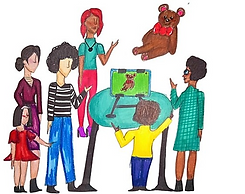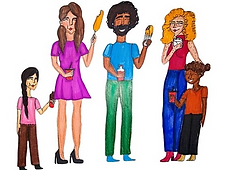Experience
Download additionnal documents
Our project is entitled « Together against discrimination » and it aims to sensitize young people and families of different backgrounds for the issue of discrimination in Luxembourg. The method we present here has shown to help people engaging with this difficult and emotionally challenging topic. If we look back at our experience, there is one important lesson that we have learnt throughout this project and that want to share with you. While the issue we tackled is urgent, the ways of engaging people in discussion about it are complex and tricky. Learning about these implications did not change our goals, but it led us to revise our ways of approaching people and “bringing” the issue to them. We noticed that if ‘discrimination’ was highlighted directly in our invitation to families and individuals to participate in a workshop, quite some people refrained from joining. While some welcomed the opportunity to talk about discrimination, others felt repelled. We heard comments like: “Why do you always bring up negative things. We don’t have a problem here in Luxembourg.” Some people felt stigmatized and uncomfortable, fearful of being socially exposed or of finding themselves in a negative space. We ourselves felt the negative energy in workshops where discrimination was set as the (main or only) topic of conversation. This led us to broaden our perspective and to rephrase our invitation. Instead of us setting discrimination as the main focus of the workshops, we invited people to think about ‘togetherness’, what it entails, and what positive or negative aspects people associate with it. We shared experiences from our workshops on our Facebook page entitled “Coming together in stop motion animation”. (add link) We found that emphasizing creativity and aspects of digital exploration proved more attractive to potential participants. “Coming together” also reflected well the fact that discovering and playing with the app created a new sense of togetherness and offered an interesting new tool for (self-)expression. Hence, this shift in address, but not in essence, worked very well. It opened doors, minds and hearts. Not addressing ‘discrimination’ directly, gave participants in our workshops the choice to talk about positive and negative experiences, or both. We achieved to create a friendly and welcoming atmosphere, in which people felt secure and in a safe space. This enabled social learning and awareness that was built through sharing, and while listening to others. This non-judgmental space helped people to open up naturally, and it brought them to share stories they had not planned to tell before they came to the workshop. Others learnt about discrimination they did not have experienced themselves, and heard about it first hand for the first time. Working with objects and sharing food are central element in our method. Objects play a role in preparing for the workshops, and throughout the entire process. Objects are also key to facilitate the interaction between participants and to create the movies in which objects become moving characters. In addition, working with objects can release strong emotions with which we need to be prepared to deal. Sharing food is an important moment during the workshops. Read more on why and how food can help connect people by clicking on the pdf in the top right corner. Considering the sensitive topics that were addressed in our workshops, we had prepared a list of different services in Luxembourg that offer psychological support and that participants could refer to if they felt the need. (/ please download the document)









